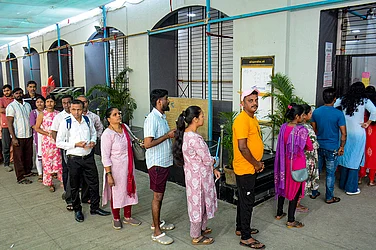A new and ‘more transmissible’ variant of Omicron, called XE, has been reportedly detected in Mumbai on Wednesday. However, the Centre has denied any evidence of its presence. The recombinant of two versions of the Omicron was said to be detected in a 50-year-old woman who had travelled back from South Africa. According to a statement by the Brihanmumbai Municipal Corporation, the variant was found in the latest genome sequencing of the BMC conducted at Kasturba Hospital.
The BMC, in its release, said, “The patient’s lab sample has been referred to Kasturba Hospital Central laboratory for whole genome sequencing. It has been found to be a new XE variant in initial sequencing. Though GISAID (Global Initiative on Sharing All Influenza Data ) also confirmed it, INSACOG has decided to go for another round of genomic sequencing at national laboratory for sure confirmation of XE variant.”
The Centre’s rebuttal, however, came shortly after BMC’s statement.
What did the Centre say?
According to the Union Health Ministry, the said present evidence does not suggest the presence of the XE variant of Covid, denying media reports that claimed that the new mutant was reported in Mumbai.
In a tweet, PIB Maharashtra said, "Hours after report of detection of XE variant of Coronavirus in Mumbai, @MoHFW_INDIA has said present evidence does not suggest the presence of the new variant.”
Clarifying further, the Ministry had said, “FastQ files were analyzed in detail by experts from INSACOG regarding the specimen being reported and they concluded that the genetic structure of this mutant does not match the genetic picture of the XE mutant.”
The Ministry added that the individual, who had tested positive for XE, is a fully vaccinated woman with no comorbidity and is asymptomatic. "She had come from South Africa on February 10 and had no prior travel history. On arrival, she had tested negative for the virus," it said.
What has WHO said?
The first case of the XE variant was detected in the United Kingdom, as confirmed by the World Health Organisation on Tuesday. WHO further said that the early indications suggest it could be around 10 per cent more transmissible than other Omicron mutations
The UK Health Security Agency (UKHSA) is studying XE - a mutation of the BA.1 and BA.2 Omicron strains - and as of March 22, 637 XE cases had been detected in England, according to official figures. Professor Susan Hopkins, the UKHSA's chief medical advisor, said such variants are known as "recombinant" and usually die off "relatively quickly".
"So far there is not enough evidence to draw conclusions about transmissibility, severity or vaccine effectiveness," Hopkins told the media. As of March 16, XE had a growth rate 9.8 per cent above that of the so-called stealth BA.2 Omicron variant - already known to be highly transmissible, the UKHSA said.
What is the new variant?
The XE variant is a type of recombinant variant, which is a new strain, created by genetic mutations from two different variants. This recombination can occur when two different variants affect the same host cell and the genomic exchange between the two variants occurs because of the way the RNA viruses copy the genomes. During the exchange, the enzymes used by the virus end up stitching together bits of different variants.
Other recombinant variants during the pandemic include XA, XB and XC.
What are the symptoms?
According to the UK Health Security Agency, XE comes with symptoms such as running nose, sneezing and sore throats unlike the symptoms of the original Covid strain that led to fever, chills, loss of smell and taste.
However, according to experts, there is insufficient evidence to draw any conclusion about the severity of the virus and vaccine effectiveness against it.


























